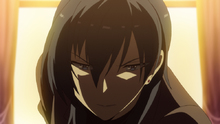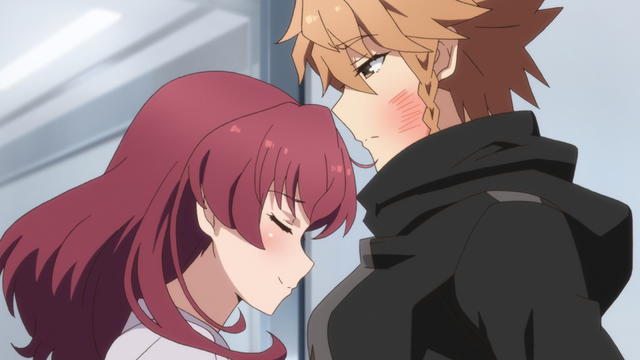From the TV anime "Torno shrine maiden" (broadcasting only), episode 17 Synopsis · Preceding scene cut & preview movie is released.
"Torno shrine maiden" is an original animation work whose main character was the shrine maiden of God Nagi that exudes the existence of the irregular shape which has threatened the world of human beings from the ancient times · The sword is exiled by the sword. Directed by Mr. Hiroki Kakimoto who served as an assistant director in the "Aoi Steel Arpeggio - Ars Nova" TV series & theater version, Mr. Takahashi Ryuya who composed a series of "Idol Master Cinderella Girls" series series composition · Characters The draft is Yoshikuni Shizuma who worked for Yamato and Musashi of "Fleet Scouting", and the production is "Studio Yuuki is a Brave", "Kinro Mosaic", "Saki - Saki - National Edition" Studio Five pairs.
⇒ Women's Junior High School x Japanese Sword's original animation "Torno shrine maiden" starts! Director Hiroki Kakimoto
⇒TOP 10 ANIME 2018
This time, the summary of the 17th episode "Madness of the Goddesses" broadcast from May 4 (Friday) · Synopsis of the scenes and preliminary scene cut and unreviewed video "Tsuyoko! The 17th episode "Madness of the Goddesses" (Front Ver.) Has been made public, so let's introduce.
Also, in the official website ( http://tojinomiko-tomoshibi.jp/ ) of the smartphone game "Torno shrine maiden engraving and flashlight" official website ( http://tojinomiko-tomoshibi.jp/ ), another version of the preview video "Takeoji! 17th episode "Madness of Goddesses" (Ura Ver.) Will be released on Friday, May 4. Please check this together as well.
[17 story, "Goddess to prosperous" Synopsis] (※ titles omitted)
<staff> Screenplay: Takahashi Tatsuya Storyboard: Fudezaka AkiraTadashi Director: Fudezaka AkiraTadashi animation director Hiroshi Kosuge, Kojima Tadaka, Sonminju
KanaYoshi And Himekawa was on board the Pacific Ocean with Akane.
It is to meet with purple which hides inside the submarine. There was also a former Mutual Guardian Maki, Sushi flower.
All of them will hear amazing facts.
⇒ Women's Junior High School x Japanese Sword's original animation "Torno shrine maiden" starts! Director Hiroki Kakimoto
⇒TOP 10 ANIME 2018
This time, the summary of the 17th episode "Madness of the Goddesses" broadcast from May 4 (Friday) · Synopsis of the scenes and preliminary scene cut and unreviewed video "Tsuyoko! The 17th episode "Madness of the Goddesses" (Front Ver.) Has been made public, so let's introduce.
Also, in the official website ( http://tojinomiko-tomoshibi.jp/ ) of the smartphone game "Torno shrine maiden engraving and flashlight" official website ( http://tojinomiko-tomoshibi.jp/ ), another version of the preview video "Takeoji! 17th episode "Madness of Goddesses" (Ura Ver.) Will be released on Friday, May 4. Please check this together as well.
[17 story, "Goddess to prosperous" Synopsis] (※ titles omitted)
<staff> Screenplay: Takahashi Tatsuya Storyboard: Fudezaka AkiraTadashi Director: Fudezaka AkiraTadashi animation director Hiroshi Kosuge, Kojima Tadaka, Sonminju
KanaYoshi And Himekawa was on board the Pacific Ocean with Akane.
It is to meet with purple which hides inside the submarine. There was also a former Mutual Guardian Maki, Sushi flower.
All of them will hear amazing facts.
【Broadcasting information】
■ "Torno shrine maiden"
· TOKYO MX: every Friday 25: 05 ~
· MBS: every Friday 26: 55 ~
· BS 11: every Sunday 25: 00 ~
· AT - X: every Friday 21: 30 ~
Repeat broadcast: every Sunday 22: 00 ~ / every Monday 13: 30 ~ / every Wednesday 29: 30 ~












 With the titular character's Academy days at an end,
With the titular character's Academy days at an end,  “It's fun to create stuff” is a positive message but not a revolutionary one. So for the final episode of
“It's fun to create stuff” is a positive message but not a revolutionary one. So for the final episode of  At least we know why that specific reveal was left out of an earlier episode—Food Wars was saving it to end the season on. That's not entirely surprising, nor is it a particularly bad plan. For a split-
At least we know why that specific reveal was left out of an earlier episode—Food Wars was saving it to end the season on. That's not entirely surprising, nor is it a particularly bad plan. For a split-

